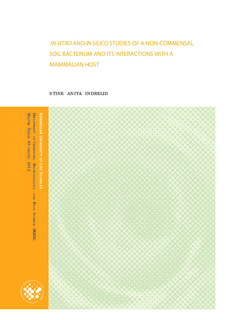| dc.contributor.author | Indrelid, Stine | |
| dc.date.accessioned | 2013-07-08T11:22:52Z | |
| dc.date.copyright | 2012 | |
| dc.date.issued | 2013-07-08 | |
| dc.identifier.uri | http://hdl.handle.net/11250/186600 | |
| dc.description | Oppgaven skal holdes konfidensiell til des 2017 av hensyn til mulig senere publisering av deler av innholdet | no_NO |
| dc.description.abstract | Methylococcus capsulatus (Bath) er en Gram-negativ, metanotrof bakterie. Til tross for at den aldri har vært beskrevet å være en del av tarmflora har M. capsulatus (Bath) vist seg å ha positive effekter ved inflammatoriske tilstander i vertebrater. M. capsulatus (Bath) hindrer utvikling av soya-indusert enteritt i Atlanterhavslaks og har vist seg å ha profylaktisk effekt ved dekstran natriumsulfat-indusert kolitt hos mus. In vitro studier har vist at M. capsulatus (Bath) kan binde seg spesifikt til humane CD14+ monocyttderiverte dendrittiske celler (DC). Denne ikke-kommensale, jordlevende bakterien ser altså ut til å kunne interagere med humane immunceller, men også å ha immunmodulerende effekter in vivo. Mekanismene bak disse effektene er imidlertid enda ikke kjent. Målet for dette arbeidet har vært å identifisere strukturer og egenskaper ved M. capsulatus (Bath) som gjør den i stand til å interagere med en vert og påvirke immunresponser. Proteomet til M. capsulatus (Bath) ble analysert ved bioinformatiske metoder. Subcellulær lokalitet for samtlige proteiner ble predikert og bakteriens sekretom ble definert. Interaksjon med DC ble studert og utskilte proteiner ble identifisert ved eksperimentelle metoder. Arbeidet ledet til identifisering av adhesiner med putative bindingsseter for adhesjonsmolekyler på vertebratimmunceller, proteiner med mulige roller i invasjon av vertsceller og proteiner med potensiell effekt på viktige immunregulatoriske signalveier i vertebrater. | |
| dc.description.abstract | Methylococcus capsulatus (Bath) is a Gram-negative, methanotroph bacterium. Although it has never been described to be part of vertebrate intestinal microbiota, M. capsulatus (Bath) has been demonstrated to have a positive effect on inflammatory conditions in vertebrates. M. capsulatus (Bath) abolishes soya induced enteritis in Atlantic salmon and to have prophylactic effect on dextran sodium sulphate induced colitis in mice. In vitro studies have shown that M. capsulatus (Bath) adheres specifically to human CD14+ monocyte derived dendritic cells (DC). This soil dwelling, noncommensal bacteria thus appear to be able not only to interact with human key immune cells, but also to have immunomodulatory effects in vivo. The mechanisms behind the seen effects, however has not been determined so far.
The objective of this study has been to identify structures and properties of M. capsulatus(Bath) that can elucidate the relationship of M. capsulatus (Bath) with mammalian hosts, and the mechanisms by which it interacts with host cells and affects inflammatory response.
The sub cellular location for all M. capsulatus (Bath) proteins has been predicted and the secretome of M. capsulatus (Bath) defined by in silico analysis. Released proteins and interactions of M. capsulatus (Bath) with DC were examined by experimental approaches. This work has identified adhesins with putative binding sites for vertebrate cell surface adhesion molecules, and possible roles in host interactions and proteins with potential effect on key immune regulatory pathways. | |
| dc.language.iso | eng | no_NO |
| dc.publisher | Norwegian University of Life Sciences, Ås | |
| dc.title | In silico and in vitro studies of a non-commensal soil bacterium and its interactions with a mammalian host | no_NO |
| dc.type | Master thesis | no_NO |
| dc.subject.nsi | VDP::Mathematics and natural science: 400::Basic biosciences: 470::Molecular biology: 473 | no_NO |
| dc.subject.nsi | VDP::Mathematics and natural science: 400::Basic biosciences: 470::General microbiology: 472 | no_NO |
| dc.description.embargo | 2017-12-15 | |
| dc.source.pagenumber | 79 | no_NO |
